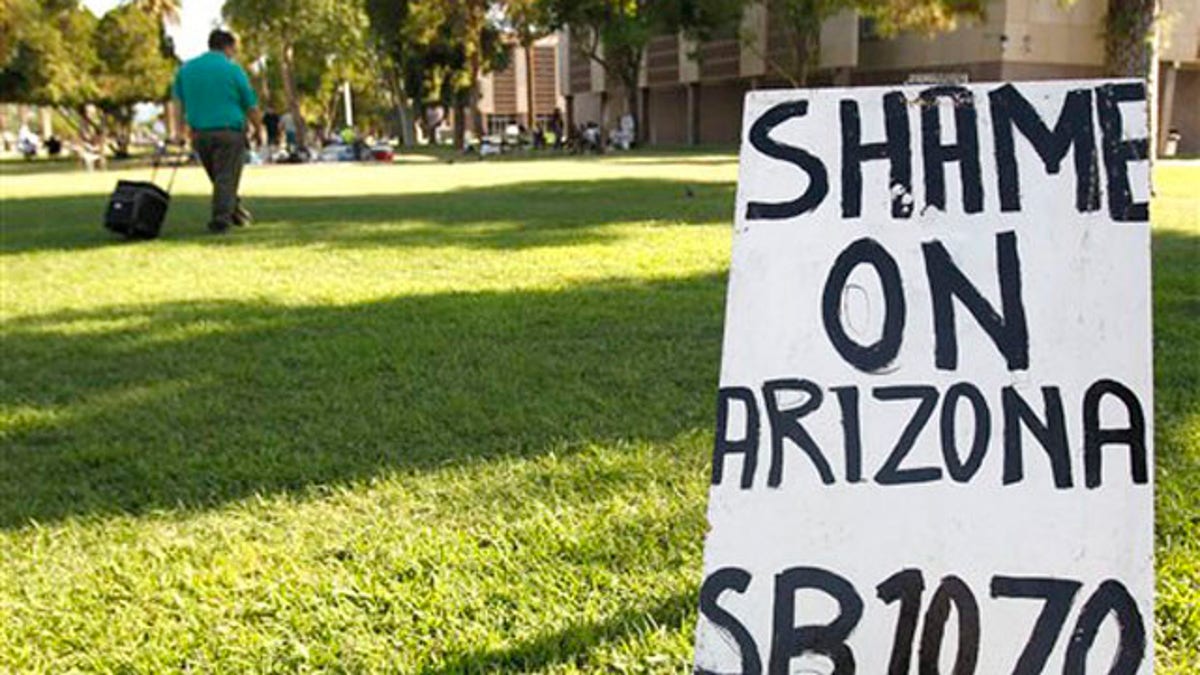
Signs set up by opponents of the Arizona immigration law are seen at the Arizona capitol July 26 in Phoenix. (AP Photo)
Arizona's tourism industry has a target on its back, but the widespread boycotts over the state's immigration law might not be hitting the mark.
Recent data compiled by a market research group show hotel bookings across the state -- as well as in tourism hot spots Phoenix and Scottsdale -- have been on the rise the past two months.
The numbers could dispel warnings from local officials that Arizona stands to lose a fortune and dampen the chances that cities and organizations will be able to compel the state to reverse its immigration law by choking its economy with a sanctions-style business boycott.
"Fundamentally, the boycotts have been unsuccessful," said Barry Broome, president of the Greater Phoenix Economic Council.
The data from hotel industry research firm STR showed that for the state of Arizona, hotel occupancy was up 5.7 percent in May and up 8.3 percent in June compared with the same time a year ago.
In Phoenix, occupancy was up 10.6 percent in June; in Scottsdale, it was up 10.7 percent for the same period. Revenue also was up, with Arizona hotels raking in $148 million last month -- up more than 11 percent from a year ago.
Broome said the state also has been able to attract new businesses to locate in Arizona despite bad publicity. He said his group plans to announce 2,000 to 3,000 new jobs thanks to investment from California, where Arizona boycotts are in place in several major cities, over the next few months.
"Business continues," said Garrick Taylor, spokesman with the Arizona Chamber of Commerce and Industry.
That doesn't mean Arizona business groups are done worrying. To the contrary, they're still on high alert over the potential damage the boycotts could do in the long run.
According to the Arizona Hotel and Lodging Association, leisure hotel bookings are up after a record bad year in 2009, but the conventions and meetings sectors have taken a hit -- a development that could cost Arizona millions over the long term given that conventions are sometimes booked years in advance.
The Greater Phoenix Economic Council and Greater Phoenix Chamber of Commerce have launched a new website to build opposition to the boycotts. The site, "Stop AZ Boycotts," features video testimonials from Arizona workers about how the boycotts have negatively affected their livelihoods.
In one, a waitress at The Arizona Center said canceled conventions have cut her earnings in half.
Taylor said that despite the recent hotel data, the boycotts could hurt Arizona's image to the point that it's "no longer a destination that is on people's radar screen."
He said part of the problem is that the backlash contributes to instability in the local economy. "It's not exactly an economic development plan," he said.
Many of the boycotts were pitched as a way to pressure Arizona to rescind its immigration law, which makes illegal immigration a state crime. The groups claimed the law, set to go into effect Thursday unless a federal government court challenge prevents it, would lead to racial profiling by unfairly targeting Hispanics regardless of their immigration status.
City governments typically banned employees from traveling to the state and in some cases moved to reconsider contracts with state businesses.
But some of those campaigns ran into glitches along the way, watering down the impact. Los Angeles exempted from the boycott a contract with an Arizona company that provided its red-light cameras. The Los Angeles City Council also is reportedly considering another exemption for airport taxi company Super Shuttle, based in Arizona.












































